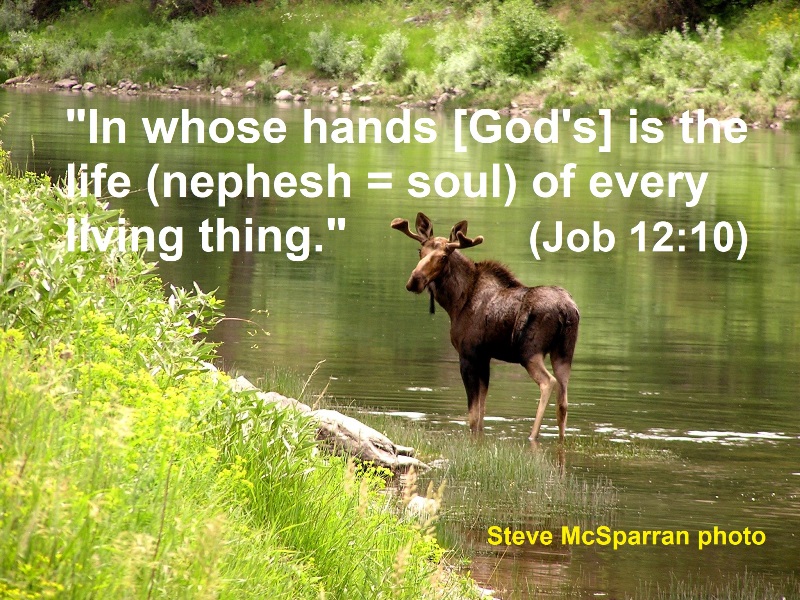Part Six: Will God Give Animal Souls Immortality?
Last week’s blog demonstrated that animals have souls. Although most Christian theologians agree, some assume animal souls are extinguished when animals dies Whether or not God will give animals immortal souls is determined to a large degree on the meaning of two Hebrew words: nephesh (soul) and ruach (spirit). If these two words describe immortal human souls and spirits and also refer to animals, it’s reasonable to conclude they too may be given immortality. Continued below photo:

Nephesh: The Hebrew word nephesh is translated soul 238 times—nearly a hundred times more than its second most common usage (life). When translated as “soul,” Nephesh refers to the immaterial part of our being that continues to exist after physical death. Nephesh also relates to animals in the following passages. (Translating nephesh as “life” in some of the following passages seems unlikely and repetitive.)
Genesis 1:20: “Let the waters team with swarms of living creatures” (nephesh—souls).
Genesis 1:24: “Then God said, ‘Let the earth bring forth living creatures (nephesh--souls) after their kind. . . .'”
Genesis 1:30: “. . . and to every beast of the earth and to every bird of the sky and to every thing that moves on the earth which has life” (nephesh--soul).
Genesis 2:19: “. . . and whatever [Adam] called a living creature (nephesh--soul), that was its name.”
Job 12:10: “In whose [God’s] hand is the life (nephesh—soul) of every living thing.”
Proverbs 12:10: “The righteous man has regard for the life (nephesh—soul) of his animal.”
In the following passages, spirit is also applied to animals. However, only people have spirits in the sense of being created in God’s image. I believe this means animals are bipartite—body and soul—unlike humans, who are body, soul, and Spirit. Therefore, animal “spirits” should not be taken to mean they have the spiritual connect with God that humans can have.
Ruach: The Hebrew word ruach is translated as breath, wind, or spirit. However, it’s used 203 times for spirit (or Spirit)—more than twice its next most common usage (wind). Moreover, translating ruach as “wind” in the following passages doesn’t make grammatical or theological sense. The following passages show that ruach translated as spirit is ascribed to animals.
Genesis 6:17: “Behold, I, even I am bringing the flood of waters upon the earth, to destroy all flesh [human and animal] in which is the breath [ruach—spirit] of life.”
Genesis 7:15: So they went into the ark to Noah, by twos of all flesh in which there was the breath [ruach—spirit] of life.
Genesis 7:22: . . . of all that was on the dry land, all in which nostrils was the breath of the spirit [ruach] of life, died.
Psalm 104: 29: You hide Your face, they [the animals] are dismayed; You take away their spirit [ruach] they expire and return to their dust.
Ecclesiastes 3:19: For the fate of the sons of men and the fate of beasts is the same. As one dies, so dies the other; indeed, they all have the same breath [ruach—spirit] and there is no advantage for man over beast.”
This brief word study shows that the Hebrew words translated soul and spirit are applied to humans and animals. In light of this, if human souls are given immortality, it’s reasonable to believe God will also bless animal souls with immortality—especially since nothing in the Bible tells us that animal souls are extinguished upon physical death.
This brings us to the very heart of this study: Will our pets resurrect and reunite with their human companions in the future new Heaven and Earth? Likewise, will the wild animals roaming Earth today resurrect and live without fear of humans in the Peaceable Kingdom? (Isa. 11: 6-9 I believe the answer to both questions is yes.
Next Week’s blog: Before I give biblical evidence for animal resurrection, I want to share the views of several well-known Christian theologians and scholars who believe in the probability of animal resurrection. That will be the topic of next week’s blog post.